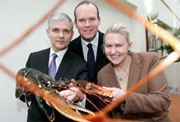BIM Hosts Networking Seminar to Facilitate Seafood Companies to Drive Growth
 Lack of scale and issues relating to route to market identified as key obstacles for the Irish seafood processing sector.
Lack of scale and issues relating to route to market identified as key obstacles for the Irish seafood processing sector.
 Lack of scale and issues relating to route to market identified as key obstacles for the Irish seafood processing sector.
Lack of scale and issues relating to route to market identified as key obstacles for the Irish seafood processing sector.
 Lack of scale and issues relating to route to market identified as key obstacles for the Irish seafood processing sector.
Lack of scale and issues relating to route to market identified as key obstacles for the Irish seafood processing sector.
Pictured at BIM’s ‘Taking Seafood to the Next Level’ Industry Seminar at the Radisson Hotel, Dublin Airport are Aodh O’Donnell, Managing Director of Errigal Seafoods, Minister for Agriculture, Fisheries and Food, Mr. Simon Coveney, T.D. and Birgitta Heidin-Curtin, Managing Director, Burren Smokehouse
Bord Iascaigh Mhara (BIM), held an intensive networking seminar, today, 25th January, 2012, where key seafood companies in Ireland met to discuss how to achieve scale in the Irish seafood sector. BIM believe that an increase in scale through the pooling of individual companies’ resources will boost profitability, reduce time to market, and improve customer service.
Over 50 seafood companies gathered in the Radisson Hotel, Dublin Airport to hear talks on the prospects for the global market, the European Market perspective for European Buyers and BIM’s concept of an Irish owned European Seafood Hub as a solution to the sector’s current route to market issues. There were also best practice talks from Joe O’Flynn, Managing Director of the Consumer Foods Division of the Irish Dairy Board and Bruno Corréard, a French Retail Consultant with previous experience as a seafood buyer for Carrefour.
Opening the event, Minister for Agriculture, Food and the Marine, Mr. Simon Coveney, T.D. outlined the key areas that the sector needs to address; ‘Seafood exports continue to perform well with an estimated growth of 13% to approximately €420 million. We have an excellent natural resource at our disposal and we have some of the best seafood entrepreneurs in attendance today that are more than capable of delivering increased growth and prosperity. But there are a number of challenges that need to be overcome to allow this to happen. The main challenges are scale, route to market and meeting market requirements. Currently, out of approximately 138 seafood companies in operation, only 40 of these have a turnover of more than €5 million, while 70 have sales of less than €1 million. In contrast, our typical European competitor has a turnover in the order of €20 million. This lack of scale limits our ability to invest in the market place and maximise the profitability of the sector. Adding value to our seafood is also required if we are to differentiate ourselves from our competitors. This seminar is a step in the right direction. I have provided significant funds to BIM in 2012 to deliver a support package that will facilitate companies to achieve scale in their operations. I would urge all companies here today to seize the opportunity and to look at new projects to grow the sector further’
Also up for discussion was Ireland’s peripheral location which presents a significant challenge to the processing industry. For companies relying on group logistics, this can result in a time to market from order to delivery of 4-6 days in comparison to 24-48 hours for a competitor based on mainland Europe. The effect of this is reflected in the average net profitability of Irish seafood processing companies which stands at 0.94% compared to that of our European competitors which stands between 4%-6%*
Access to raw material is also a key challenge. All indicators suggest that in the medium to long-term, wild caught fish quotas will not increase to any great degree, limiting access to raw material. As a result, Irish seafood companies are faced with the challenge of adding value to existing resources, sourcing sustainable raw material, improving scale and efficiencies and integrating their route to market.
BIM are working on a number of projects to overcome these issues including the development of deep Sea farms which if put in place are capable of producing up to 15,000 tonnes of Irish organic farmed salmon per farm annually. At today’s prices, 15,000 tonnes of organic grade Irish salmon is worth €102 million to the market every year. BIM has already set a target of €50 million in additional value-added sales by 2013 by working with companies on new product development in its purpose built Seafood Innovation Hub (SDC), differentiation of Irish seafood through Eco-certification and by encouraging the European fishing fleet to partner with Irish processors. This partnership would result in adding value to raw material here rather than shipping direct to the continent, thereby providing logistical advantages to both parties.
Jason Whooley, BIM’s CEO explained the importance of the event; ‘There is a major market opportunity available to the Irish Seafood processing sector in the medium term; the increased global demand driven by population growth in developing countries particularly in Asia and Africa, are good examples of this. Our International competitors are gearing up for that opportunity and we need to think long term and get ahead of the game. If we can use this seminar to discuss solutions to ensure we can meet this opportunity then the industry will benefit from increased profitability across the board’